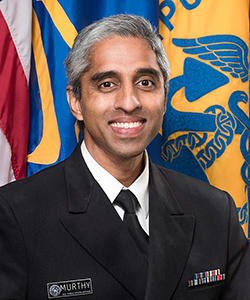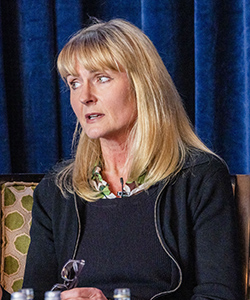The potential negative health impact of social media use is attracting greater attention from researchers and policymakers. David Lynch reports
The possible health impacts of social media use have been in the headlines in recent weeks.
Writing last month in The New York Times, the US Surgeon General Dr Vivek Murthy called for health warnings to be placed on social media platforms for younger users.
“The mental health crisis among young people is an emergency – and social media has emerged as an important contributor,” outlined Dr Murthy in his piece.
Dr Murthy cited research showing that American adolescents who spend more than three hours a day on social media face “double the risk of anxiety and depression symptoms, and the average daily use in this age group, as of the summer of 2023, was 4.8 hours”. Nearly half of adolescents say that social media makes them feel worse about their bodies.

He said warnings should state that “social media is associated with significant mental health harms for adolescents”.
Dr Murthy compared such measures to warnings that have been placed on tobacco products. While noting the need for more academic research on the topic, he wrote that sometimes in medicine, “you don’t have the luxury to wait for perfect information.”
Dr Murthy’s comments have resonated internationally, including in Ireland.
Last month the IMO called for a “step change” in how this country responds to the “clear threat to the mental health of young people” emanating from social media platforms. The negative consequences of social media use had been a key theme at the Organisation’s Annual General Meeting (AGM) in April.
IMO
Prof Matthew Sadlier, Chair of the IMO consultant committee and Consultant Psychiatrist, said the US Surgeon General’s remarks had “profound significance”. He argued they reflected the “absolute confidence which is now evident across the medical community internationally” that social media platforms “present a real danger to users, especially young users”. Prof Sadlier said social media companies needed to prove safety before launching new products and innovations.
“It is important that use of social media is not excessive,” Prof Brendan Kelly, Professor of Psychiatry at Trinity College Dublin and Consultant Psychiatrist at Tallaght University Hospital, Dublin, told the Medical Independent (MI). “Health authorities should issue clear general advice to this effect.”
But he added it is also important to recognise the world “has changed, and social media is here to stay, in one form or other”.
“Excessive use of social media, like excessive use of anything, is unhelpful.”
Prof Kelly argued that the “techno-panic” about social media, artificial intelligence, and other technological advances “is part of a long history” of anxious reactions to innovations such as the printing press, steam power, industrialisation, cars, television, and the Internet.
“Every generation believes the ‘threats’ it faces are of a different order to those of the past, that current technology is more different, and vastly worse.”
Is there sufficient research to give a clear picture of social media influence on population health?
“No,” Prof Kelly answered. He said most of the discussion to date has not been informed by comprehensive data and is driven mainly by surveys.
“Moreover, we need to focus on not only social media, but all aspects of the lives of young people…. Life is changing and must be examined in its totality.”
Government position
At the IMO AGM, a series of motions were passed regarding social media. These included a call for a ban on smartphone use by pupils within primary schools, and a “well-funded public health strategy to combat social media addiction” along the lines of the Government’s Tobacco Free Ireland policy.
For its part, the Department of Health informed MI that “significant steps” have been taken to develop a Government position on online safety and regulation, “most importantly” through the Online Safety and Media Regulation Act, 2022.
The Act established Coimisiún na Meán (CnaM), which will “be empowered to hold social media companies to account through a binding” online safety code.
The Department spokesperson described this as “a significant development in online safety, as we move from an era of self-regulation by social media companies to one of State regulation”.
“CnaM will have robust monitoring, enforcement and sanction powers.”
The Department is currently working with CnaM in drafting of the code with a focus on harmful content relating to eating disorders, self-harm, and suicidality. The code will also encompass commercial communications relating to the promotion of foods that are high in fat, salt, and sugar, as well as infant and follow-on formula.
Public health lens
The motions passed by IMO doctors in April reflect the broader public health lens that is increasingly being applied to social media.
Dr Amrit Kaur Purba (PhD), a researcher from the Oxford Internet Institute, University of Oxford, UK, noted that “historically, the influence of social media and internet usage has been primarily examined by scholars in the fields of psychology and computer science”.
In her previous position at the Medical Research Council/Social and Public Health Sciences Unit, University of Glasgow, Dr Purba was the lead author of a 2023 British Medical Journal paper, ‘Social media use and health risk behaviours in young people: Systematic review and meta-analysis’ (see panel p4).
Dr Purba outlined that in more recent times, there has been a “notable shift towards causal-based research, leading to a rise in publications emerging from public health and epidemiological disciplines”. This shift is attributed to the methodologies employed in these disciplines, which are “well-suited” for exploring causal effects.
“For instance, my background in epidemiological research supported me in investigating the potential causal relationship between social media use and adolescent health risk behaviours during my PhD research,” she told MI.
“Understanding this potential causal relationship required a deep comprehension of epidemiological risk factor research and causal epidemiology.”
The issue of social media use at a population-level is currently being discussed among public health doctors in this country. A spokesperson for the Irish Society of Specialists in Public Health Medicine told MI that the Society is planning to prepare a position paper on social media.
“We agree this issue requires some expert guidance and public health advocacy to support parents and schools in ensuring the health and wellbeing of children and adolescents in relation to social media and internet use,” the spokesperson said. “However, as it is an emerging area there may be severe limitations on what evidence is available to inform guidelines.”
‘Technocapitalism’
Some experts question whether the HSE or another health body issuing public health guidelines is the best next step. “I’m not convinced it’s the right approach, to be honest,” Prof Debbie Ging (PhD), Professor of Digital Media and Gender, School of Communications at Dublin City University, told MI. “It’s based on an outdated concept that screen time is separate to ‘real life’ and, like smoking, somehow avoidable or optional.”
Prof Ging, who addressed doctors at the IMO AGM on these issues, said the reality is that our entire societal and economic infrastructures “are now fully digitalised and therefore constantly driving us into our phones and devices – we have to open apps to pay bills, transfer money, book medical appointments, listen to music, or drive from A to B”.

She added that “most importantly” our technologies are the product of our social and economic system.
“Let’s not forget that this same system – ‘technocapitalism’ – is eroding our privacy, destroying the environment, widening the gap between rich and poor and between the global north and south, driving property prices through the roof, and making people ill through stress, anxiety, and overwork.”
“So, if I were issuing a public health guideline it would be: ‘Technocapitalism kills’.”
She added that the research indicates that screen time is less an issue than “screen content and the context in which children are engaging with digital media” (see panel p5).
“I think we probably need to be asking different questions – about the type of content aimed at children, targeted advertising, the role of recommender algorithms, and other technical features that facilitate negative body image, bullying or image-based sexual abuse, exposure to harmful content, and the addictive nature of certain platforms and apps.”
Prof Ging said the for-profit social media models in operation currently are not the only option. “This generation could radically re-imagine the Internet given the right tools,” she outlined. “To this end, we urgently need to teach critical digital media literacy in schools and beyond, to empower both children and parents to make informed decisions in a way that does not jeopardise children’s rights to communication, play, creativity, and information.”
Prof Ging said this is not to say that there are no health impacts associated with screen time, although “conclusive evidence of causality has been difficult to prove because there are so many other societal factors at work”.
“Handing phones and tablets to babies is, no doubt, teaching instant gratification, and spending too much sedentary time online in lieu of physical and social activity can of course lead to obesity and lack of social skills.”
However, she added the “bigger issue is a more complex political and ideological” one.
Building up the research base
While still an emerging field, a body of evidence is gathering regarding the impact of social media usage on the health of children, young adults, and broader society.
Dr Amrit Kaur Purba (PhD) is a postdoctoral researcher from the Oxford Internet Institute, University of Oxford, UK. She is the lead author of the 2023 British Medical Journal (BMJ) paper, ‘Social media use and health risk behaviours in young people: Systematic review and meta-analysis.’
The paper sought to examine the association between social media use and health risk behaviours in adolescents (defined as those 10 to 19 years). It concluded that social media use is associated “with adverse health risk behaviours in young people”.
However, it added “further high-quality research” is needed to establish causality, understand effects on health inequalities, and determine which aspects of social media are most harmful.
With the recent comments by the Surgeon General in the US on the issue, and the growing research base, is there a possible role for health authorities or other bodies to provide public health guidelines in this area?
“Social media has fundamentally reshaped adolescent peer interactions, offering significant benefits for connection,” Dr Purba told the Medical Independent.
“However, its potential negative impact on adolescent health has raised considerable concern among parents, caregivers, educators, practitioners, policymakers, and adolescents.”
Dr Purba noted this concern has led to the introduction of international policies aimed at improving online safety. These include the UK Online Safety Bill (2023), the European Commission’s Digital Services Act (2022), and the German Network Enforcement Act (2017).
“Despite these efforts, there is still a lack of understanding about which specific aspects of social media may be harmful to adolescent health, partly due to the infancy of social media research.”
She said that this suggests that current policies might lack the high-quality, relevant, up-to-date information required for making evidence-informed decisions regarding adolescent social media use.
“In response to this, there has been an increase in causal research in this field, which is better positioned to inform policy,” she said. “Although this research is still in its early stages, academics are rapidly adopting causal methods to address the need for high-quality research to guide policy.”
Dr Purba added that this type of research is time-consuming and heavily reliant on robust, comprehensive data, as well as on real-time social media data from social media corporations or users, “which are challenging to obtain”.
Regarding explicit social media use guidance, existing screen time recommendations acknowledge the lack of robust evidence for specific time thresholds considered ‘healthy’.
“Therefore, they suggest that adolescent screen time limits be set through family negotiations. Parents and caregivers typically have a deeper understanding of their child’s individual needs, how they use social media, and how social media might displace other important activities like physical exercise, social interactions, and sleep.”
She added that “importantly” the type of social media used, the user’s motivations, socio-cultural context, and environment are crucial considerations for policy development, rather than relying solely on numerical values like time spent.
Unlike chemical compounds, such as alcohol, for which explicit guidelines can be established, Dr Purba said social media usage does not lead to uniform, quantifiable changes in health across populations.
“Thus, policy development and research should incorporate these multifaceted factors to create effective guidelines. The academic community is committed to incorporating these considerations into their research efforts.”
The BMJ paper can be accessed at: www.bmj.com/content/383/bmj-2022-073552
The dark side of social media
The possible negative influence of social media, particularly on young men, has been the subject of much public debate and growing research.
Prof Debbie Ging is Professor of Digital Media and Gender in the School of Communications at Dublin City University where she teaches and researches on gender, sexuality, and digital media. Much of Prof Ging’s academic focus is on digital hate, online anti-feminist men’s rights politics, the ‘incel subculture’ and radicalisation of boys and men into male supremacist ideologies.
“The key impact of engagement with this type of content is that young people’s worldview becomes distorted when fed a constant stream of fake science and anecdotal ‘evidence’ of women’s inferiority,” Prof Ging told the Medical Independent.
“While many boys and men reject these messages as sexist and unrealistic, others, especially those experiencing financial or emotional insecurity, may find their simplistic and misguided explanations helpful and gratifying.
“We are now seeing many boys and men acting these ideas out, in the classroom, at home and, most worryingly, in their sexual relationships.”
She warned that from a sexual health perspective, “this is potentially rolling back the progress that has been made in terms of teaching about consent, emotional openness, equality, and women’s sexual agency, and the negative impacts are being experienced primarily by girls and women.”













Leave a Reply
You must be logged in to post a comment.